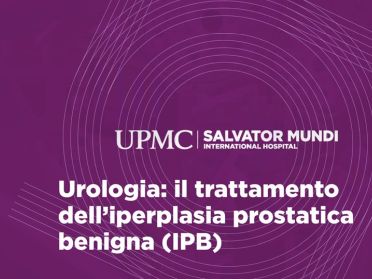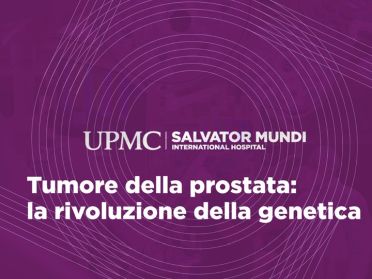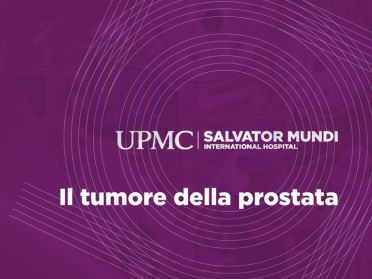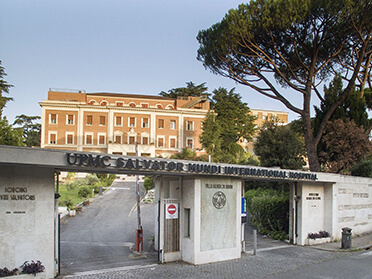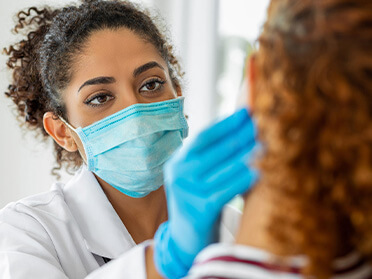Urology and Andrology at UPMC Salvator Mundi International Hospital
At UPMC Salvator Mundi International Hospital, we offer comprehensive services for the prevention, diagnosis and treatment of diseases of the urinary and genital systems, both male and female.
Thanks to a highly specialized team and the use of minimally invasive and robotic technologies, we ensure personalized care pathways aligned with the most advanced international standards.
Conditions Treated
Main conditions treated:
- Benign prostatic hyperplasia (BPH) and prostatic adenoma
- Prostate cancer (prostatic carcinoma)
- Bladder cancer
- Kidney cancer
- Testicular cancer
- Kidney and urinary tract stones
- Sexual disorders, such as erectile dysfunction
- Male infertility
- Urogenital prolapse
- Varicocele
- Peyronie's disease (or curved penis)
- Urinary incontinence (male and female)
- Recurrent urinary infections
- Pediatric conditions (phimosis, short frenulum)
Our Services: Urological and Andrological Diagnostics
At UPMC Salvator Mundi International Hospital, we perform advanced diagnostic tests for the evaluation of urinary and andrological conditions using cutting-edge technology and a multidisciplinary approach.
Imaging diagnostics
Non-invasive tests to study the morphology and health status of the kidneys, bladder, prostate, penis, and testicles:
- Kidney-bladder ultrasound
- Suprapubic bladder and prostate ultrasound
- Urinary tract ultrasound
- Transrectal prostate ultrasound
- Dynamic penile Color Doppler ultrasound (ECD)
- Scrotal Color Doppler ultrasound (ECD)
Bioptic diagnostics
Tissue sampling techniques for histopathological analysis, essential for diagnosing tumors, particularly of the prostate:
- Prostate needle biopsy with anesthesia
- Fusion prostate needle biopsy (targeted biopsy combining ultrasound and MRI images)
Endoscopic diagnostics
Direct visual examination of the urinary tract, useful for diagnosing inflammation, obstructions, or tumors:
- Cystoscopy (bladder exploration using a flexible probe)
Functional diagnostics
Tests that assess the functioning of the urinary tract and the muscles involved in urination:
- Uroflowmetry (measurement of urinary flow)
- Invasive urodynamic examination
- Electromyography (evaluation of neuromuscular activity)
Our Services: Advanced Urological and Andrological Procedures
At UPMC Salvator Mundi International Hospital, we offer personalized treatments for urological and andrological conditions using minimally invasive approaches, robotic technologies, and state-of-the-art laser systems.
Robotic and Minimally Invasive Surgery
The Da Vinci® robotic system is used to treat a wide range of urologic diseases, including:
- Robot-assisted prostate adenomectomy (RARP) – A minimally invasive surgery to remove an enlarged portion of the prostate, typically for benign prostatic hyperplasia (BPH).
- Radical nephrectomy (NPR) – Surgical removal of an entire kidney, usually due to kidney cancer. Robotic assistance allows for greater precision and reduced recovery time.
- Radical cystectomy (CRAD) – Complete removal of the bladder, typically for muscle-invasive bladder cancer. It may be followed by urinary diversion procedures.
- Pyeloplasty – A reconstructive surgery to correct a blockage or narrowing at the junction between the kidney and the ureter (ureteropelvic junction). Robotic pyeloplasty is commonly used for congenital or acquired obstructions.
Learn more about Robotic Surgery at UPMC Salvator Mundi International Hospital.
Treatment of Urinary Stones
- Ureterolithotripsy (ULT).
- Percutaneous nephrolithotripsy (PCNL).
- Retrograde intrarenal endoscopic lithotripsy (RIRS).
Therapies for Benign Prostatic Hyperplasia (BPH)
- Water vapor therapy (Rezum).
- HoLEP laser.
- ThuLEP laser.
Treatments for Bladder Conditions
- Transurethral resection of the bladder.
- Intravesical instillation.
Andrology and Male Sexual Health
- Focal therapy.
- Intracavernous drug injection.
- Andrological rehabilitation.
- Frenulotomy.
Functional Rehabilitation
- Pelvic floor rehabilitation
Meet Our Specialists in Urology
- Prof. Alessandro Amici
- Prof. Claudio Anceschi
- Prof. Pierluigi Bove
- Dr. Pasquale Gambardella
- Dr. Valerio Iacovelli
- Dr. Giuseppe La Pera
- Dr. Domenico Marzano
- Prof. G. Antonio Marrocco
- Dr. Gabriella Mirabile
- Prof. Carlo Molinari
- Dr. Maria Rosaria Pareo
- Dr. Filomena Petta
- Dr. Diego Pozza
- Dr. Mariangela Pozza
- Dr. Tommaso Riga
- Dr. Carlo Torcia
- Dr. Matteo Vittori
Frequently Asked Questions about Urology and Andrology
When should you see a urologist?
If you experience symptoms such as difficulty or urgency in urinating, blood in the urine, lower back pain, incontinence, recurrent infections, erectile dysfunction, or infertility, it is recommended to consult a specialist for a targeted evaluation.
What tests will the urologist prescribe?
They may include urine analysis, blood tests (such as PSA), ultrasounds, uroflowmetry, urodynamic tests, cystoscopy, or prostate biopsies. The choice depends on your symptoms and risk factors.
How often should you urinate during the day?
It’s normal to urinate between 4 and 8 times a day. If you often wake up at night to urinate, it could be a condition such as nocturia, which should be evaluated by a urologist.
What can I do to prevent kidney stones?
Drink at least 2–3 liters of water per day and reduce your intake of salt, animal proteins, and oxalates (e.g., spinach). Lemon may help thanks to its citric acid content.
What if I suffer from incontinence or overactive bladder?
Kegel exercises, pelvic floor rehabilitation, and dietary changes are often recommended. In some cases, medications such as beta-3 agonists (e.g., mirabegron) may be prescribed, while antimuscarinic drugs are generally avoided in older adults.
What is PSA and is the test really necessary?
PSA is a marker used in prostate cancer screening. It is recommended after age 50, or earlier if there is a family history. However, it does not distinguish between benign prostatic hyperplasia and cancer, so further diagnostic evaluation is necessary.
Am I confusing BPH with prostate cancer?
No: BPH (benign prostatic hyperplasia) is a non-cancerous enlargement, while cancer affects a different area of the prostate. Although they may share similar symptoms, they require different approaches and treatments.
How should I prepare for my first urology appointment?
Bring a list of your medications, recent medical reports, lab or ultrasound results, and any relevant family medical history. A thorough clinical history helps the specialist quickly define a targeted diagnostic pathway.
What should I expect during a cystoscopy or a prostate biopsy?
These are routine procedures. Cystoscopy may cause mild discomfort, while prostate biopsy is performed under anesthesia and is generally well tolerated. Patients are carefully monitored to minimize any discomfort.
When is robotic surgery beneficial?
It is recommended for cancers of the prostate, kidney, or bladder, as well as for reconstructive procedures of the pelvic floor. Benefits include: less invasiveness, greater precision, faster recovery, and better aesthetic outcomes.

We offer medical services and services on a private basis or in agreement with the main insurance companies. Some of our services are also affiliated with the National Health System.
For more information on active agreements, visit:
